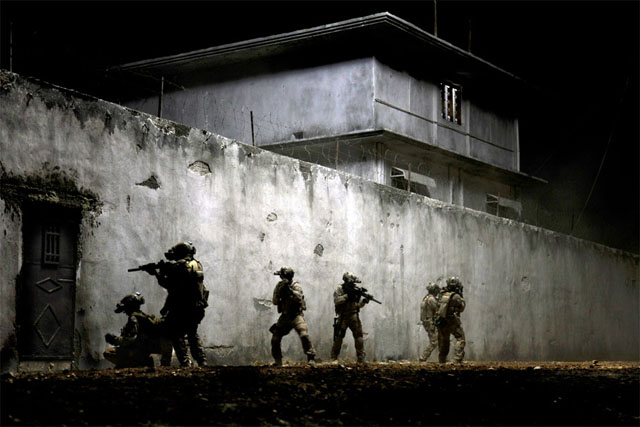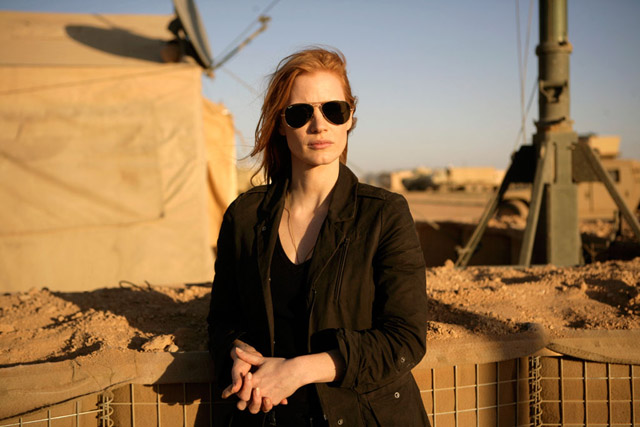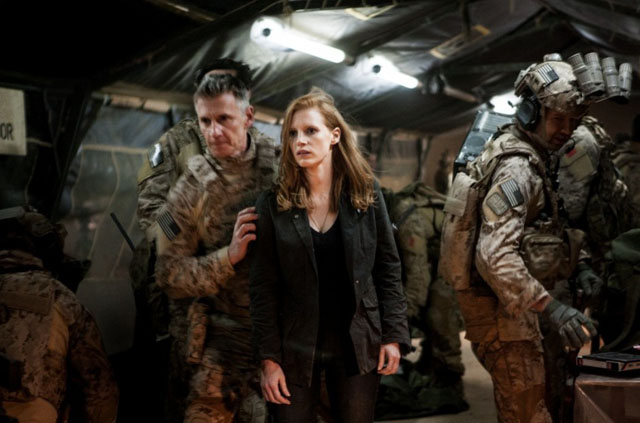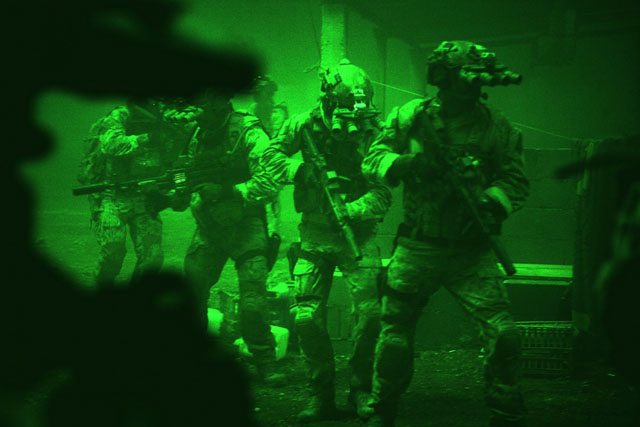“Whether you call it well informed speculative history, docu-drama recreation or very stripped down suspense filmmaking, Zero Dark Thirty matches form and content to pretty terrific ends,” begins Todd McCarthy in the Hollywood Reporter. “A long-arc account of the search for Osama Bin Laden seen from the perspective of an almost insanely focused female CIA officer who never gives up the hunt until the prey ends up in a body bag, Kathryn Bigelow’s and Mark Boal’s heavily researched successor to The Hurt Locker will be tough for some viewers to take, not only for its early scenes of torture, including water boarding, but due to its denial of conventional emotionalism and non-gung ho approach to cathartic revenge-taking…. Even though it runs more than two-and-a-half hours, Zero Dark Thirty is so pared to essentials that even politics are eliminated; there’s essentially no Bush or Cheney, no Iraq War, no Obama announcing the success of the May 2, 2011 raid on Bin Laden’s in-plain-sight Pakistani compound.”
“Essentially, it’s a police procedural on the grand scale,” writes Time‘s Richard Corliss. “First and last, Zero Dark Thirty is a movie, and a damned fine one. Like Argo—which, with all due respect to director Ben Affleck and the film’s many admirers, ZDT blows out of the water—it dramatizes a true-life international adventure with CIA agents as the heroes. (And it takes fewer fictional liberties with the source material than Affleck did.) In the tradition of Truman Capote’s In Cold Blood and Tom Wolfe’s The Right Stuff, Boal tracked down the particulars of a sensational exploit and, skipping the ‘non-fiction novel’ stage, created an original screenplay that provides a streamlined timeline of the hunt for bin Laden. The word ‘docudrama’ doesn’t hint at Boal’s achievement. This is movie journalism that snaps and stings, that purifies a decade’s clamor and clutter into narrative clarity, with a salutary kick.”
For the New York Times, Michael Cieply and Brooks Barnes have spoken with the filmmakers: “Despite their attention to the facts, Ms. Bigelow and Mr. Boal both pointed out that Zero Dark Thirty remained a thriller and not a kind of documentary intended to stand up to nit-picking by historians. For instance, their film is rooted—more by cinematic choice than by historical necessity—in the experience of a young American intelligence operative, Maya, who is portrayed by Jessica Chastain. Maya, the filmmakers said, is real. She is based on a young woman who was deployed in the war on terror, with details changed or eroded to protect her identity, and is just one of the film’s many points of contact with a set of facts that is only now becoming known as working journalists continue to produce books and articles about the Bin Laden pursuit.”
Bigelow and Boal “were working on a different bin Laden-focused project, about the failed effort to kill him in Tora Bora in 2001, when history caught up with them and bin Laden was killed in [May] of 2011,” notes Katey Rich at Cinema Blend. “As they told Entertainment Weekly, they scrapped the Tora Bora project to make Zero Dark Thirty after the news broke, but they haven’t ruled out returning to it. Asked if a Zero Dark Thirty prequel could happen, Boal said ‘Yeah, I think so. Why not?'”
Update: “Wildly more ambitious than The Hurt Locker, yet nowhere near so tripwire-tense, this procedure-driven, decade-spanning docudrama nevertheless rivets for most of its running time by focusing on how one female CIA agent with a far-out hunch was instrumental in bringing down America’s most wanted fugitive,” writes Variety‘s Peter Debruge. “The title, military-speak for half past midnight, refers to the Al Qaeda leader’s time of death, theoretically promising a flashy firsthand account of the raid itself. Why then does it star Jessica Chastain, skeptics wondered, not realizing that Bigelow and Boal had reduced the spectacular assault on bin Laden’s compound in Abbottabad, Pakistan, to the last half-hour in order to dedicate the rest to making history…. Chastain—who aced no fewer than six supporting roles the previous year—has the chops to embody the pic’s iron-nerved protag, holding her own in the testosterone-thick world of CIA black sites and top-level Washington boardrooms.”
Updates, 11/26: Writing for Screen, Tim Grierson finds that Bigelow’s “commitment to a dispassionate, stripped-down approach results in a film whose impact sneaks up on you, leaving you blindsided by its visceral final reels…. Bigelow has made a career out of directing action-oriented thrillers (Point Blank, Strange Days), but the first half of Zero Dark Thirty represents something new for her: a detective story that’s almost a procedural…. And while Chastain carries the movie, her co-stars are perfectly exact in their small, crucial roles, particularly [Jason] Clarke as Maya’s mentor who wonders if he should abandon this bin Laden hunt before it kills him—or at least his spirits.”
Anne Thompson saw ZDT yesterday afternoon, when “an exhausted Bigelow admitted that she had signed off on the final mix just four days ago…. Bigelow deploys 120 speaking parts—her cast ranges from Venezuelan (Edgar Ramirez) to Australian (Clarke and Joel Edgerton as the leader of the Navy SEAL team that raids the Bin Laden compound) to British (Stephen Dillane, [Mark] Strong, [Jennifer] Ehle)—and three to four roving cameras to catch the unfolding action in wide-ranging locations from India, Egypt and Jordan to London and Washington, D.C. ‘You shoot it, you do it,’ said Clarke. ‘You bust your ass, the long takes give vitality.'”
At the Playlist, Rodrigo Perez finds ZDT to be “dispassionate, clinical and grindingly thorough” but also “as gripping and riveting as any film in this fact-finding methodology-based genre.”
“Boal isn’t doing a puff magazine profile here,” writes HitFix‘s Kristopher Tapley. “This isn’t even shoe-leather reporting—it’s boot-leather reporting, and he’s managed journalism by way of the cinema in a brilliant way here.”
“It’s a rarity, a truly entertaining film that never condescends to its audience or cheapens history and truth,” writes James Rocchi at Box Office. “Watching the film, you learn everything from how Navy SEALS open a locked door to, ironically, how the high secrecy of Bin Laden’s house in Abbotabad, Pakistan is what gave it away. You don’t get a lot of explanation—no one ever says any dead exposition or rehashes Wikipedia entries about the film’s torrent of names and places, people and organizations—and it’s nice to enjoy an American film that assumes you have intelligence and relies on it…. Much like bomb disposal in The Hurt Locker, Zero Dark Thirty is about intelligence as a job—one done by people, and one where people can make mistakes—and that like all jobs, intelligence involves co-workers you don’t like, late hours, petty turf grabs and ass-covering lies, just with deadly consequences. The superb camerawork is by Greig Fraser, with Dylan Tichenor and William Goldenberg’s editing propelling the story and focusing your attention but never forcing either. Stark and tough and smart, Zero Dark Thirty is a masterwork from a master filmmaker, a truly exceptional work that combines the questions and qualms so often found in the grey areas of the real world with the kind of storytelling and art so rarely found in the shared darkness of the movie theater.”
“In several of the film’s early scenes, Chastain watches as our guys brutalize a captured foe by waterboarding and sexually humiliating him, among other punishments,” notes Kyle Buchanan, who caught an early screening for Vulture. “However, that inhumane treatment then leads to valuable intel, so you’re forced to ask: Did the ends justify the means? Bigelow and Boal were quick to note after the screening that the film doesn’t comment either way on the use of torture; rather, it’s included because it’s part of the warts-and-all official record. ‘I wish that it wasn’t a part of history, but it is and was,’ Bigelow said, admitting that the scenes were the most difficult for her to film.”
ZDT “has an integrity to it that is bracing and adult, and it manages to deliver a major visceral experience without ever once bending to Hollywood convention,” writes Drew McWeeney at HitFix, where Gregory Ellwood has more notes on that Los Angeles screening.
Update, 11/27: An A+ from Indiewire‘s Eric Kohn: “Given the chance to give her story a happy ending, Bigelow smartly blankets it in shades of ambiguity. Zero Dark Thirty tracks a full range of emotions associated with the proverbial war on terror, from the naivete of its earliest stirrings to the spirit of vengeance that gave its apparent victory such a vital quality in the Western world…. Bigelow’s engaging nail-biter avoids the pratfalls of ‘spiking the football,’ as the President described the danger of celebrating bin Laden’s death. Instead, it’s an opportunity to sober up.”
Update, 11/28: “Chastain, who was a lock for an Oscar nomination before Zero Dark Thirty even debuted, owns the screen as the driven workaholic agent whose tireless fixation on a needle-in-a-haystack lead ultimately proves vital to finding bin Laden,” writes Jen Yamato at Movieline. “She looks a little too great doing it, too—a pillow-lipped, flame-haired beauty who manages to look luminous even when other characters are helpfully commenting that she’s rundown and haggard…. The men around Maya describe her as a ‘killer,’ and though she struggles at first to stomach the sight of a detainee being waterboarded for intel, within a few years she’s adopted the torture tactics that made headlines out of Guantanamo. Boal’s script goes heavy on the gender politics and too light on character development, portraying Maya as a woman so devoted to her mission that she has no time for silly things like friends, love, life balance…. Still, the girl power moments are utterly satisfying; when the overlooked Maya makes her presence and contribution known in a roomful of male colleagues by barking an expletive at Tony Soprano himself (James Gandolfini as CIA head Leon Panetta), who can care that she has virtually no back story of her own?”
Updates, 12/2: “It’s a curious thing,” notes Alison Willmore at Movieline, “that two of the awards season’s most significant films are stealthy procedurals: Lincoln, which beneath the surface gloss of a prestige biopic is a vivid showcase of the messy, difficult means by which the amendment to outlaw slavery was passed, and Zero Dark Thirty, which is an examination of how contemporary warfare has so much more to do with information than with sending troops out into battle…. While Steven Spielberg’s film uses these exertions to bring animation, prickliness and warmth to characters that could have been wax-museum distant, Bigelow’s consciously holds its emotions at arm’s length, where they’ll be less likely to interfere with the work being done.”
“The usefulness of torture is one of Zero Dark Thirty‘s several hard and unflinching and deliberately presented truths,” notes Richard Lawson at the Atlantic Wire. “In its length and up-close intensity, Zero Dark Thirty struck me as almost a geopolitical version of David Fincher’s Zodiac, another movie about an individual consumed with a hunt that most others have given up…. [W]atching these only lightly fictionalized versions of competent people do their tricky detective analysis is both satisfying and a little scary—the way they can glean usable, important information from a satellite image’s tiniest details should perhaps give us all pause about being so thoroughly observable.”
“What’s refreshing about Zero Dark Thirty is just how honest and ballsy it is,” writes Movies.com‘s Erik Davis. “There’s not really a happy ending, and it’s definitely not the feel-good movie of the holiday season, but it’s the truth.”
For Marlow Stern, writing at the Daily Beast, ZDT “transcends its military-procedural brethren through its strict attention to detail; its straightforward delivery, never kowtowing to overzealous pseudo-patriotism; and the engrossing character, Maya.”
Updates, 12/3: ZDT is the #1 film of the year for New York‘s David Edelstein: “This is a phenomenal piece of action filmmaking—and an even better piece of nonaction filmmaking. It also borders on the politically and morally reprehensible. By showing these excellent results—and by silencing the cries of the innocents held at Abu Ghraib, Bagram, and other ‘black sites’—it makes a case for the efficacy of torture. How to reconcile these two feelings? The debate begins December 19.”
And the New York Film Critics Circle given ZDT its best film, director, and cinematographer awards.
Updates, 12/9: For Frank Bruni, writing in the NYT, “the movie of the year is also the political conundrum of the year, a far, far cry from the rousing piece of pro-Obama propaganda that some conservatives feared it would be…. And it presents the kind of torture that Cheney advocated—but that President Obama ended — as something of an information-extracting necessity, repellent but fruitful…. [N]ot only does Zero Dark Thirty decline to toe a conventionally liberal line, but it is being embraced by many cultural arbiters who are probably at some level horrified by the conclusions it seems to reach.”
“Lean, muscular, and shorn of sentimentality, Zero Dark Thirty is consistently absorbing, even as it makes the case that morally-repugnant torture was absolutely necessary in order to discover the whereabouts of Osama bin Laden,” finds Peter Martin, writing in Twitch. “Note that the film… does not argue in favor of torture. Instead, it endeavors to lay out facts like railroad tracks; torture leads to the breakdown of an insider, who then provides information on another insider, which then leads the investigators, ultimately, to their desired destination, i.e., the location of bin Laden.”
“Maya’s femininity affects her character in many fascinating, tiny ways, but it’s just one of the many rich details that makes Zero Dark Thirty so riveting,” writes Katey Rich for the Guardian. “Telling a nearly three-hour story with an ending everyone knows, Bigelow and Boal have managed to craft one of the most intense and intellectually challenging films of the year.”
Updates, 12/10: A few backgrounders and interviews have appeared in the past couple of days, and the one to begin with is Mark Harris‘s—he goes deep and long in New York: “Before the raid, the filmmakers had planned to make a narrowly focused, closed-ended story that would have ended on a note of irresolution and futility. But Zero Dark Thirty is something else: a stark procedural epic that stretches from 2001 to 2011—ten years of fitful intelligence progress and setbacks so staggering that, by the time the virtuosic reenactment of the Abbottabad raid arrives, audiences will be tallying what that achievement cost America, and what costs may be yet to come. It’s a movie that confirms Bigelow and Boal’s position as probably our most prominent and least sentimental cultural custodians of the post-9/11 war era.”
Steven Zeitchik talks with Bigelow and Boal for the Los Angeles Times, and writes: “Zero Dark Thirty likely will take its place alongside classics of war cinema such as The Dirty Dozen, Apocalypse Now, and Saving Private Ryan while simultaneously redefining the form. Few Hollywood action thrillers have contained so many documentary-style aspirations to truth and urgency—and so quickly after an epochal event, to boot.”
And Dexter Filkins talks with Bigelow for the New Yorker.
Glenn Greenwald, who readily admits he has not seen ZDT, turns a column into the Guardian based on what he’s read about it: “What this film does, then, is uncritically presents as fact the highly self-serving, and factually false, claims by the CIA that its torture techniques were crucial in finding bin Laden. Put another way, it propagandizes the public to favorably view clear war crimes by the US government, based on pure falsehoods.” Naturally, this has sparked quite a bit of back and forth on Twitter. At Vulture, Jesse David Fox picks up the story.
Indiewire‘s Eric Kohn: “At the end of a long press day in New York last week, the bleary-eyed pair [Bigelow and Boal] wearily sidestepped any attempt to discuss the movie in political terms.”
Stream Alexandre Desplat’s score at Ray Pride‘s place.
In Contention‘s Kristopher Tapley talks with editor William Goldenberg, who cut Argo by himself but worked with Dylan Tichenor on ZDT.
Updates, 12/12: The real life of the CIA agent on whom Chastain’s Maya is based “has followed a more problematic script,” reports Greg Miller for the Washington Post. “The operative, who remains undercover, was passed over for a promotion that many in the CIA thought would be impossible to withhold from someone who played such a key role in one of the most successful operations in agency history. She has sparred with CIA colleagues over credit for the bin Laden mission. After being given a prestigious award for her work, she sent an e-mail to dozens of other recipients saying they didn’t deserve to share her accolades, current and former officials said. The woman has also come under scrutiny for her contacts with filmmakers and others about the bin Laden mission, part of a broader internal inquiry into the agency’s cooperation on the new movie and other projects, former officials said.”
“Zero Dark Thirty does not present torture as a silver bullet that led to bin Laden; it presents torture as the ignorant alternative to that silver bullet.” Spencer Ackerman argues a convincing case for Wired.
And in Slant, John Semley adds that “to Bigelow and Boal’s credit, their lightning-rod opening scenes are as matter of fact as imaginable, their frankness evoking the comparable scenes of hardheartedness depicted nearly 60 years ago in Godard‘s Le Petit Soldat. Zero Dark Thirty is nothing if not a forthright, above-board, cards-on-the-table kind of film—Redacted without the mitigating anger (or cheesy acting, thankfully). Without soapboxing or speechifying, Zero Dark Thirty effectively declassifies the extent of SOP Bush-era prisoner abuse and, while doing so, questions its procedural and moral efficacy. Characters make a point of saying that information extracted through torture is unreliable, yet it’s hard to imagine the more fruitful, lead-generating tips given ‘freely’ by detainees during more agreeably conversational interrogations being offered up so easily without the threat of torture lurking somewhere in the near dark. The situations in the film are depicted as vexingly complex, and ditto its thorny moral matrix. And so, to amend Pope John Paul II’s notorious response to Mel Gibson’s passion-play provocations, ‘It is as it is.'”
Slate‘s Emily Bazelon argues that “while the movie is putting a thumb on the scale for torture, the film doesn’t get the role it played in the Bin Laden chase condemnably wrong. I do think the movie reads as pro-torture, and as someone who opposes the practice, I wish that it didn’t. But it’s a problem of emphasis and degree, not absolute falsity. And in dissecting the movie, it’s only fair to keep in mind a valid point about torture that makes liberals uncomfortable: We can’t prove it never produces useful intelligence, or, probably, that it had no impact at all on the CIA’s hunt for Osama Bin Laden.”
“Zero Dark Thirty isn’t strictly designed to make us morally uncomfortable, which is exactly why it’s morally discomfiting,” writes Stephanie Zacharek at Film.com. “Bigelow’s aim is not to tell us what to think; she even refuses to tell us outright what she thinks.” This film “isn’t a brief, the multiplex’s equivalent of a white paper, a thing we can sum up in a two-minute takeaway. Instead, it’s a stunning, confident, tensile piece of work held together by doubt rather than moral certainty—as if Bigelow and her screenwriter Mark Boal were operating from the idea that doubt is dynamic, while moral certainty is just another kind of stasis.”
Updates, 12/16: First off, the handling of torture in ZDT has branched off into a debate that’s grown bigger and louder than any other discussion related to the film. David Poland‘s asked Chastain and Jason Clarke what they make of all this:
Glenn Greenwald has now seen the film and is sticking to his guns—more than ever: “The film absolutely and unambiguously shows torture as extremely valuable in finding bin Laden.”
Andrew Sullivan, who’s done more than anyone else to help Greenwald kick up the shitstorm he was after, has also now finally, actually seen the film: “It is, before anything else, a brilliant piece of filmmaking…. The first thing I’d say on the political issue is that the film shows without any hesitation that the United States brutally tortured countless suspects—innocent and guilty—in ways that shock the conscience. To my mind, that is, in fact, a huge plus for those of us who have been trying to break through the collective denial and the disgusting euphemism of ‘enhanced interrogation.’ No one can look at those scenes and believe for a second that torture is not being committed.” And: “It played no role in finding any clues as to the whereabouts of bin Laden in the movie and in reality. The breakthroughs in the movie come from traditional interrogation and intelligence…. The torture was not for intelligence (and it provided nothing reliable as well as countless leads that were dead ends). It was for revenge. It was an emotional lashing out at often random Muslim suspects (and some genuine terrorists) for killing so many Americans. There was no reason behind it and no law.”
But Jane Mayer, author of The Dark Side: The Inside Story of How the War on Terror Turned Into a War on American Ideals, argues that ZDT “distorts” history: “In addition to excising the moral debate that raged over the interrogation program during the Bush years, the film also seems to accept almost without question that the CIA’s ‘enhanced interrogation techniques’ played a key role in enabling the agency to identify the courier who unwittingly led them to bin Laden.”
And in the Christian Science Monitor, Peter Rainer argues that “Bigelow has made an amoral movie—which is, I would argue, an unconscionable approach to this material. I don’t understand those critics and commentators who denounce this film’s amorality and then go on to laud the movie anyway—as if a film’s moral stance, or lack of the same, was incidental to its achievement.”
Well. Again, many others, like Sullivan and Ackerman, saw a different movie. The ZDT they saw depicts the horror of torture and its futility. Tom Carson in the American Prospect: “Can you imagine the outcry if an anodyne version of ZD30 had just left all of that out—the black sites, the brutalized detainees, the whole ‘enhanced interrogation’ nightmare? Wouldn’t a lot of the same people pillorying Bigelow now be accusing her instead of whitewashing the CIA and the Bush-Cheney administration by omitting those dirty deeds? Knowing they were dirty is one truth we should all acknowledge, and Zero Dark Thirty does.”
He’s got more in GQ, and both links come via Nick Pinkerton in another excellent column for Sundance NOW, which is, like most of his there, structurally a little too complex for a clean snippet. There is this, though: “ZD30 does what screen drama should do, demands that we take it out of the theater and into our homes.”
“W








